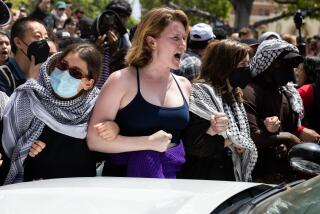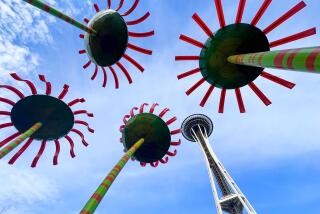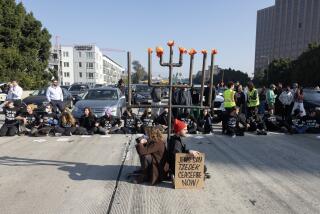Seattle’s Radical Past Fails to Prepare It for Present Upheaval
- Share via
SEATTLE — Last year, when University of Washington students took to the streets to protest an anti-affirmative action initiative, they did it the way people usually do things here: They were organized. They were polite and civil.
“They took care to call police and let them know exactly where they were going to be marching, what streets they would turn on,” recalled King County Executive Ron Sims. “That’s very Seattle. Organized dissent is enjoyed here. What happened yesterday is not what we’re accustomed to.”
“What happened” Tuesday were daylong protests intermittently interrupted by mini-riots of window-breaking and trash can-burning throughout central Seattle. By day’s end, Mayor Paul Schell had declared a state of civil emergency and called in the National Guard. Seattle was, as Schell put it, “shocked and embarrassed.” Newscasters blared about chaos in the streets. Talk show callers ranted about the decline of morality.
Some Demonstrators Help Repair Damage
On Wednesday, the windows were still broken and the graffiti still scrawled on walls. But the sun rose behind a deep gray sky, a west wind blew chilly and wet off the bay and some of the demonstrators were back downtown helping to repair the damage.
In other words, Seattle--one of America’s most orderly and mild-mannered cities--hasn’t completely blown its top. Protesters and police played cat and mouse from afternoon through early evening again Wednesday. The police fired tear gas and concussion grenades to break up knots of demonstrators, who refrained from the sort of vandalism that had occurred the previous day.
Civic leaders--some still reeling at a bit of lost innocence--had regained their political feet sufficiently Wednesday to begin talking about “the triumph of free speech” and dialoguing and the importance of the process.
Sims, the chief political officer of the county in which Seattle is located, recounted how he and Sheriff Dave Reichert drove through downtown late Tuesday night. They came upon a Radio Shack store with broken windows and looters inside. The sheriff hopped out and chased away the looters, but Sims was shaken.
He and the sheriff looked at each other and said: “Looters, can you imagine? People in Seattle looting?”
“I guess it just means we’re more like everybody else than we thought,” Sims said Wednesday. “It just means that Seattle is a global city, and we’re going to have to learn to live with it.”
Seattle until very recently was a damp, backwoods outpost--isolated by mountains and water.
It wasn’t cool; it was cold and wet. It was the farthest thing from hip. People came here not to get rich, but to get away from places people went to get rich. It was a small town, a place where visitors marveled at losing their wallets or handbags, only to have them returned, contents intact.
The protests--and the reactions to them--are evidence of a place still learning to live with the contradictions that have grown along with Seattle’s rise as a world port and cultural center.
Washington is the most trade-dependent state in the country, with trade affecting one in every three jobs. Yet it also is home to one of the country’s strongest environmental movements, frequently the fiercest of trade critics.
The Seattle area is at once home to the largest number of millionaires per capita anywhere in the world, perhaps in human history, and it has one of the nation’s highest rates of unionized workers.
The region is heir to a deep tradition of social protest, labor activism and dissent.
Washington state was a redoubt for the Wobblies, the country’s most outspokenly socialistic labor union. The only citywide, all-union general strike ever to occur on American soil happened here in 1919. James Farley, an advisor to Franklin D. Roosevelt, once referred to the “47 states and the Soviet of Washington.”
Given this history, David Clay, a Boeing machinist, said Wednesday that he was surprised any local politician could be shocked by what was happening now.
“Where the hell have these guys been?” Clay said.
This activist tradition has been translated today into a political environment where everyone expects to be--and generally is--heard. It has led to the creation of the most inclusive, overlapping, process-oriented government systems ever devised. Seattle politicians routinely discuss even small issues for years before taking action.
Nick Licata, a Seattle councilman who comes out of the city’s fervid left-leaning neighborhood politics, said the one clear message of this week’s protests is that there are a number of very angry people who don’t like the way things are going. They might not even know what they’re mad at, Licata said.
“There’s a real growing economic gap between people that is manifesting itself as resentment, as people who are just angry,” he said. “It’s the kind of anger that causes rocks to go through the window at Starbucks. Throwing rocks is not political activism; it’s visceral response to something that’s wrong.”
No one doubts the very real concerns that provoked the demonstrators. Even Schell, a former port commissioner and longtime trade promoter, lamented that the world “economy has outstripped political capacity” to deal with it.
Changing Attitude Toward Protesters
City Council President Sue Donaldson said the different ways in which police responded to protesters Tuesday and Wednesday could be read as a sign that Seattle overnight had entered, reluctantly, into a new era. Tuesday, protesters were allowed to do pretty much as they saw fit. Wednesday, they were pursued aggressively, arrested and hauled off to jail.
“This could be a coming-of-age event,” Donaldson said.
Michael Ross’ reactions as she watched in horror while protesters smashed store windows next door to her small downtown boutique reflected some of Seattle’s own contradictions.
“I’m quite sympathetic to the protesters, frankly. I protested the Vietnam War during the late ‘60s. It was very conflicting yesterday, watching this going on, knowing my own politics versus not wanting my own store to be trashed. It was the first time in my life I felt slightly Republican,” she said.
Then she paused.
“No,” she said, “it didn’t go that far.”
--- UNPUBLISHED NOTE ---
This story has been edited to reflect a correction to the original published text. Seattle’s general strike took place in 1919, not 1912.
--- END NOTE ---
More to Read
Sign up for Essential California
The most important California stories and recommendations in your inbox every morning.
You may occasionally receive promotional content from the Los Angeles Times.













